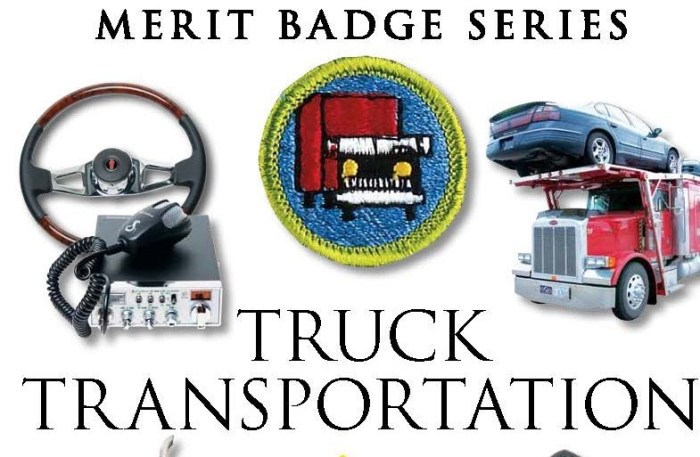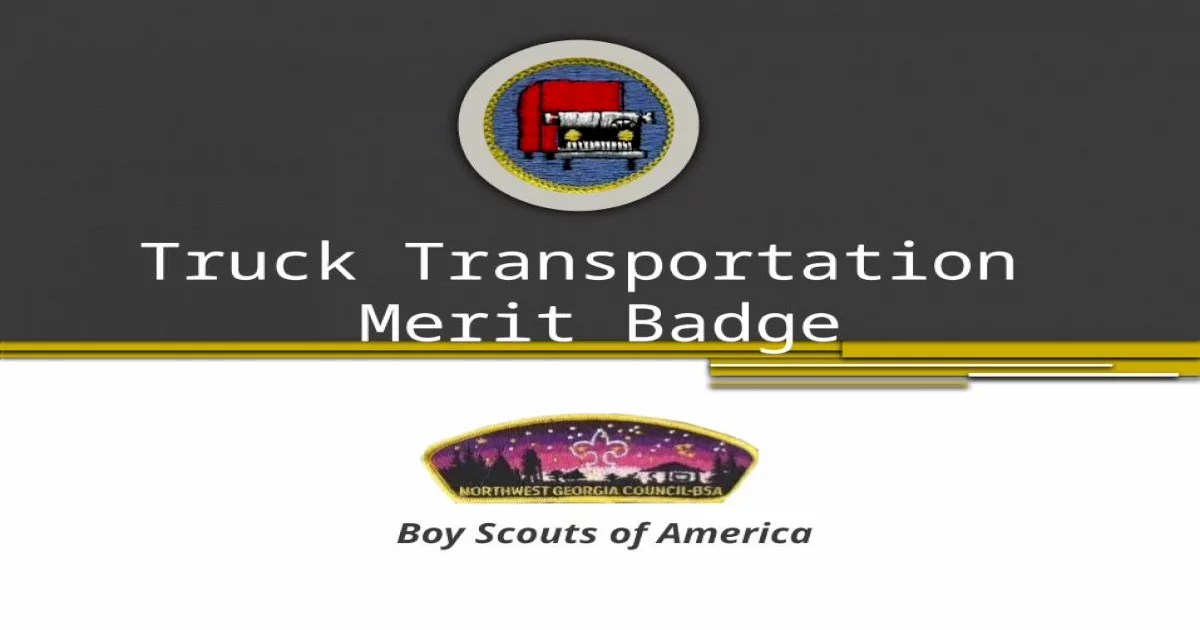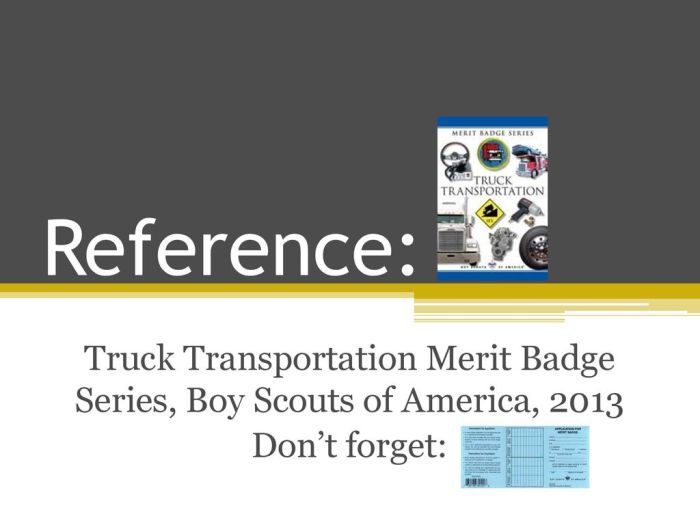Truck transportation merit badge logistics plays a pivotal role in the intricate web of the logistics industry, shaping the movement of goods across vast distances. Delve into the intricacies of truck transportation, from route optimization to fleet management, safety regulations, economic impact, environmental considerations, and emerging trends.
With its indispensable contribution to global supply chains, truck transportation stands as a cornerstone of economic growth and societal well-being. Uncover the strategies and advancements that drive efficiency, safety, and sustainability in this dynamic sector.
Truck Transportation Overview
Truck transportation plays a pivotal role in the global logistics industry, accounting for a significant share of freight movement. Trucks offer flexibility, cost-effectiveness, and accessibility, making them indispensable for transporting goods across various distances and regions.
There are diverse types of trucks employed in transportation, each tailored to specific applications. These include:
Flatbed Trucks
- Designed to transport oversized or irregularly shaped cargo.
- Equipped with a flatbed platform without sides or a roof.
Reefer Trucks, Truck transportation merit badge logistics
- Equipped with refrigeration units to maintain specific temperatures.
- Used for transporting perishable goods, such as food and pharmaceuticals.
Tanker Trucks
- Designed to transport liquids or gases.
- Equipped with specialized tanks and pumps.
Box Trucks
- Enclosed vehicles with a cargo area that can be accessed through a rear door.
- Suitable for transporting general merchandise, small packages, and household goods.
Logistics Planning for Truck Transportation

Logistics planning plays a critical role in optimizing truck transportation efficiency, ensuring timely deliveries, and reducing operational costs.
Route planning is paramount, involving determining the most efficient routes for trucks to take, considering factors such as traffic patterns, weather conditions, and vehicle capacities. Optimization tools and technologies, such as GPS tracking systems, route planning software, and predictive analytics, assist in calculating optimal routes, minimizing travel time and fuel consumption.
Route Planning and Optimization
- GPS tracking systems provide real-time data on truck location and progress, enabling dispatchers to monitor and adjust routes as needed.
- Route planning software optimizes routes based on multiple criteria, including distance, travel time, traffic patterns, and vehicle specifications.
- Predictive analytics uses historical data and machine learning algorithms to forecast traffic congestion, road closures, and weather conditions, enabling proactive route adjustments.
Safety and Regulations in Truck Transportation
The trucking industry operates under a stringent set of safety regulations and standards to ensure the well-being of drivers, the public, and the environment. These regulations are enforced by government agencies, such as the Federal Motor Carrier Safety Administration (FMCSA), and industry organizations.
One of the most critical aspects of safety in truck transportation is driver training and certification. Drivers must undergo comprehensive training programs that cover topics such as safe driving practices, vehicle maintenance, and hazardous materials handling. They must also pass a series of written and practical exams to obtain their commercial driver’s license (CDL).
Driver Hours of Service Regulations
To prevent driver fatigue, the FMCSA has established hours of service (HOS) regulations that limit the number of hours a driver can operate a commercial motor vehicle (CMV) within a specific period. These regulations include:
- A maximum of 11 hours of driving time per day
- A maximum of 60 hours of driving time in a 7-day period
- A mandatory 10-hour break after 14 hours of on-duty time
Vehicle Safety Inspections
Trucks are subject to regular safety inspections to ensure they meet minimum safety standards. These inspections are conducted by qualified inspectors and cover various aspects of the vehicle, including brakes, tires, lights, and mechanical components. Vehicles that fail to meet these standards may be placed out of service until the necessary repairs are made.
Hazardous Materials Transportation
The transportation of hazardous materials (hazmat) is a highly regulated activity. Trucks carrying hazmat must be equipped with special placards and labels to identify the type of material being transported. Drivers must also receive specialized training and certification in hazmat transportation.
Enforcement of Safety Regulations
Enforcement of safety regulations in truck transportation is essential to protect the public and ensure compliance. Government agencies and industry organizations conduct inspections, audits, and investigations to identify violations and take appropriate enforcement actions, which may include fines, penalties, and suspension or revocation of operating authority.
Fleet Management for Truck Transportation

Fleet management plays a crucial role in the efficiency and profitability of truck transportation operations. Effective fleet management involves a comprehensive approach that encompasses vehicle maintenance, driver management, and technology integration.
Vehicle Maintenance
Proper vehicle maintenance is essential to ensure the safety, reliability, and longevity of the fleet. Effective fleet management includes:
- Regular preventive maintenance inspections and repairs
- Tracking maintenance history and scheduling repairs
- Using diagnostic tools to identify potential problems early
- Implementing preventative maintenance programs
Driver Management
Drivers are the backbone of any truck transportation operation. Effective fleet management involves:
- Recruiting, hiring, and training qualified drivers
- Monitoring driver performance and providing feedback
- Ensuring driver compliance with safety regulations
- Providing incentives and rewards for good performance
Technology Integration
Technology plays a vital role in modern fleet management. Effective fleet management involves:
- Using GPS tracking systems to monitor vehicle location and performance
- Implementing telematics systems to collect data on fuel consumption, idling time, and other metrics
- Using mobile apps to communicate with drivers and provide real-time updates
- Adopting predictive analytics to identify potential issues and improve efficiency
Economic Impact of Truck Transportation

Truck transportation plays a vital role in the economic prosperity of businesses and nations alike. Its impact is far-reaching, extending beyond the mere movement of goods.
Job Creation and Economic Growth:
- The trucking industry is a significant employer, providing millions of jobs in various sectors, including drivers, logistics personnel, and maintenance workers.
- Truck transportation contributes to economic growth by facilitating the efficient movement of raw materials, finished goods, and essential supplies, which supports business operations and consumer demand.
Revenue Generation:
- The trucking industry generates substantial revenue through freight charges and related services.
- In the United States alone, the trucking industry contributes over $700 billion annually to the economy.
Case Study:
A study by the American Trucking Associations found that the trucking industry supports over 7 million jobs and contributes $791.7 billion to the U.S. GDP. The industry’s economic impact is particularly pronounced in rural areas, where it is a major source of employment and economic development.
Environmental Considerations in Truck Transportation

The transportation sector, including truck transportation, significantly impacts the environment. Trucks emit greenhouse gases, air pollutants, and noise, contributing to climate change, air quality degradation, and noise pollution. To address these environmental concerns, the industry is exploring various strategies to reduce emissions and promote sustainability.
One key strategy is the adoption of alternative fuels and technologies. Electric trucks, powered by batteries or hydrogen fuel cells, produce zero tailpipe emissions, eliminating greenhouse gas emissions and air pollution. Hybrid trucks, combining traditional diesel engines with electric motors, also offer improved fuel efficiency and reduced emissions.
Additionally, the use of aerodynamic designs, lightweight materials, and efficient tire technologies can further reduce fuel consumption and emissions.
Government Regulations and Incentives
Government regulations and incentives play a crucial role in promoting the adoption of sustainable truck transportation practices. Regulations, such as emission standards and fuel efficiency requirements, drive innovation and encourage manufacturers to develop cleaner technologies. Incentives, including tax credits and grants, provide financial support for businesses investing in alternative fuels and vehicles.
Industry Initiatives
The trucking industry is also taking proactive steps to reduce its environmental footprint. Many companies have set ambitious sustainability goals, including reducing greenhouse gas emissions, improving fuel efficiency, and investing in renewable energy sources. Partnerships between trucking companies, logistics providers, and technology companies are fostering collaboration and innovation in developing sustainable solutions.
Conclusion
Environmental considerations are increasingly shaping the future of truck transportation. By embracing alternative fuels and technologies, implementing government regulations and incentives, and driving industry initiatives, the sector is working towards reducing its environmental impact and promoting sustainability. These efforts will not only benefit the environment but also enhance the long-term viability and competitiveness of the trucking industry.
Future Trends in Truck Transportation: Truck Transportation Merit Badge Logistics

The trucking industry is undergoing a period of rapid transformation, driven by emerging technologies and changing consumer demands. These trends are reshaping the way goods are transported, and they are likely to have a profound impact on the industry in the years to come.One
of the most significant trends is the rise of autonomous vehicles. Self-driving trucks have the potential to revolutionize the industry by reducing costs, improving safety, and increasing efficiency. Autonomous trucks could also help to address the shortage of truck drivers, which is a major challenge for the industry.Another
major trend is the electrification of trucks. Electric trucks are more environmentally friendly than diesel trucks, and they can also be cheaper to operate. As the technology continues to improve, electric trucks are likely to become more popular, especially for short-haul and urban deliveries.Data
analytics is also playing an increasingly important role in the trucking industry. By collecting and analyzing data from trucks and drivers, companies can improve safety, efficiency, and customer service. Data analytics can also be used to develop new products and services that meet the changing needs of shippers and consumers.These
are just a few of the trends that are shaping the future of truck transportation. As these trends continue to evolve, the industry is likely to become more efficient, sustainable, and customer-focused.
Autonomous Vehicles
Autonomous vehicles are one of the most promising technologies for the future of truck transportation. Self-driving trucks have the potential to reduce costs, improve safety, and increase efficiency.One of the biggest benefits of autonomous trucks is that they could help to address the shortage of truck drivers.
The American Trucking Associations estimates that the industry will need to hire 1.1 million new drivers by 2028. Autonomous trucks could help to fill this gap by allowing companies to operate trucks without drivers.Autonomous trucks could also improve safety. Human error is a major factor in truck accidents, and autonomous trucks could eliminate this risk.
Self-driving trucks are also less likely to be distracted or fatigued than human drivers.Finally, autonomous trucks could increase efficiency. Self-driving trucks could operate 24 hours a day, 7 days a week, without taking breaks. This could help to reduce shipping times and improve the overall efficiency of the supply chain.
Electric Trucks
Electric trucks are another important trend for the future of truck transportation. Electric trucks are more environmentally friendly than diesel trucks, and they can also be cheaper to operate.Electric trucks produce zero emissions, which is a major benefit for the environment.
Diesel trucks are a major source of air pollution, and electric trucks could help to reduce this pollution.Electric trucks are also cheaper to operate than diesel trucks. Electricity is cheaper than diesel fuel, and electric trucks have fewer moving parts, which means less maintenance.As
the technology continues to improve, electric trucks are likely to become more popular, especially for short-haul and urban deliveries.
Data Analytics
Data analytics is playing an increasingly important role in the trucking industry. By collecting and analyzing data from trucks and drivers, companies can improve safety, efficiency, and customer service.Data analytics can be used to identify safety risks, such as drivers who are fatigued or speeding.
Companies can then use this information to take steps to reduce these risks.Data analytics can also be used to improve efficiency. By analyzing data from trucks, companies can identify ways to improve fuel efficiency and reduce maintenance costs.Data analytics can also be used to improve customer service.
By tracking the location of trucks and shipments, companies can provide customers with real-time updates on the status of their orders.These are just a few of the ways that data analytics is being used to improve the trucking industry. As the technology continues to develop, data analytics is likely to become even more important in the years to come.
Closing Summary
The future of truck transportation holds immense promise, with autonomous vehicles, electric trucks, and data analytics poised to revolutionize the industry. As the logistics landscape continues to evolve, truck transportation merit badge logistics will remain a vital component, ensuring the seamless and efficient flow of goods that underpin our modern world.
FAQ Overview
What is the significance of truck transportation in the logistics industry?
Truck transportation is the backbone of the logistics industry, responsible for moving a vast majority of goods across the country and internationally.
How can route planning and optimization improve truck transportation efficiency?
Route planning and optimization tools help carriers plan the most efficient routes for their trucks, considering factors such as traffic patterns, weather conditions, and vehicle capacity, leading to reduced fuel consumption, improved delivery times, and lower operating costs.
What are the key components of effective fleet management for truck transportation?
Effective fleet management involves maintaining vehicles, managing drivers, and integrating technology to optimize operations. This includes regular maintenance, driver training, GPS tracking, and fuel management systems.
